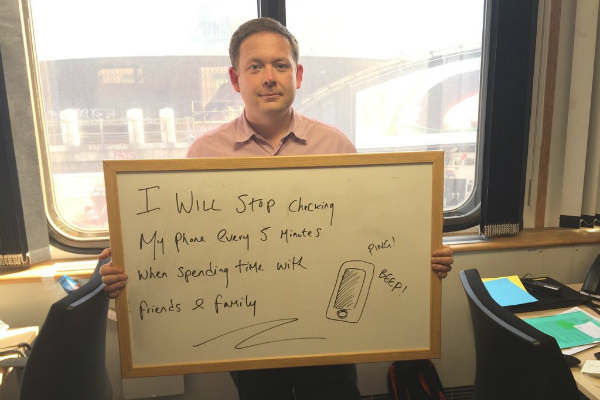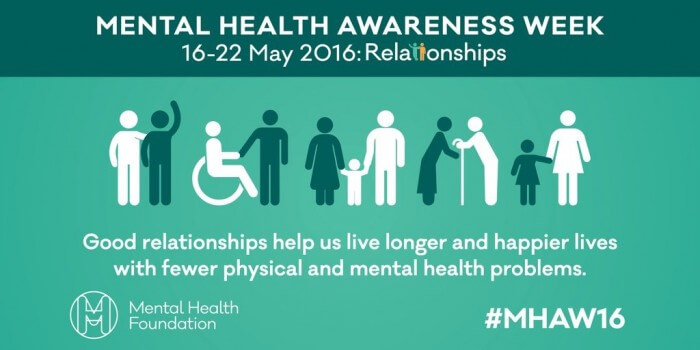It’s Mental Health Awareness Week from 16 to 22 May, and this year’s theme is relationships, not just romantic ones (though they’re good too!).
Our mental health is so important to our everyday lives, and affects many of us in so many ways – from depression and phobias, to stress and anxiety, the list goes on. It’s estimated that 1 in 4 people in England will experience a mental health problem in any given year. So chances are, either you’ve experienced some form of mental health issue, or you know someone close to you that has.
RELATIONSHIPS MATTER
Healthy relationships are vital to positive mental health. The Mental Health Foundation says they’re just as important as other lifestyle factors such as eating well, exercising more, and stopping smoking.
Good relationships help us live longer and happier lives with fewer mental health problems. Hurrah! So this means you actually have no excuse not to hang out with your bestie and gossip lots! Or call up your gran and see how she’s doing.
TAKE A BREAK
Give yourself time and take a break, have a KitKat. (Ahem, sos, the power of marketing…) Serious stuff back, put time aside to look after your important relationships. If you can’t remember the last time you had some alone time with your partner, set aside a date night/day for some quality time together. And no, this doesn’t include catching up on the latest Game of Thrones. Keep meaning to see family members, but can’t find the time? Put a date in the diary, even if it’s a month away, and go out for coffee/drink/food so the pressure is off hosting.
BE IN THE MOMENT
This does sound like four-cheese-pizza level of cheese (yum), but be present and in the moment. In the world of a plethora of social media, you just go to check Facebook and next thing you know you’re in a addictive spiral 4 hours later, YouTubing every video Jennifer Lawrence has ever been in. It’s SO tempting to check your phone, or work emails when you’re with family and friends. But try and resist the temptation, and instead be there for the people that matter most to you. Listen to what they have to say and try not to judge them. We all react and respond differently in situations, so even if you might tell an nasty ex to do one, it doesn’t mean your mate will.
BE LISTENED TO
Don’t bottle everything up. Share how you’re feeling. How you’re really feeling, not just the brave face you’re putting on, and allow yourself to be listened to and supported. If you’re not much of a sharer but need some help, there are tonnes of charities out there, so you don’t have to feel alone. The Samaritans are a great start, they’ve got volunteers around the clock so you can chat at any time, off the record. They can help you explore your options or just simply listen.
If your mental health is affecting your life in a big way – be it sleep, anxiety, eating disorders, post-traumatic stress – speak to your GP. They can refer you to counselling via the NHS, so yes that means it’s free! They can help you deal with any negative feelings you might have. A lot of people are worried about therapy, and think it won’t work but there’s a LOT of evidence for it, and what’ve you got to lose? You can ramble, rant, cry and you don’t have to feel like you’re burdening a family/friend/partner (not that you ever should). But counsellors listen and can offer their expertise because it’s their job.
WEIGHED DOWN
As much as healthy relationships can make a great positive impact on your life, unhealthy ones can have detrimental effects. Be it a friend, colleague, family member, partner, if they’re making you unhappy it’s not cool. Recognising where you have negative relationships can help you move forward to finding solutions, be that taking a break from someone or working through things. Relate offers support if you’re in a relationship, whatever age or sexual orientation you are, and they have licensed counsellors across the UK. They can also offer advice via phone, email and live chat.
If things are really serious and you have a relationship that you think might have become abusive (this can be psychological, financial, physical, sexual, organisational) don’t be afraid to ask for help. Refuge offer support via a helpline, as do Women’s Aid.
RELATIONSHIP RESOLUTIONS
The Mental Health Foundation want to spread the word about the importance of mental health, so let them know your relationship resolution or tweet @mentalhealth with what you’re going to do to value the special people in your life.





